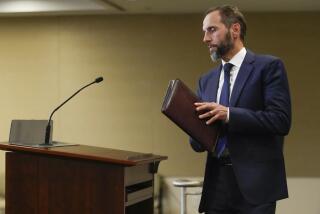A federal judge lifts the cone of silence over national security letters
A federal judge in San Francisco on Friday ruled unconstitutional one of the most controversial features of the Patriot Act: the ability of the FBI to demand records from phone companies, Internet service providers, banks and credit agencies in complete secrecy and without judicial review.
The “national security letters” issued by the FBI don’t cover the content of someone’s communications, just the circumstances. But that information alone can be highly revealing; for example, the letters can be used to catalog which websites someone visited and with whom they corresponded by email.
District Judge Susan Illston held that the law unconstitutionally barred the service providers who receive the letters from discussing them publicly until the government gave them permission. That “gag rule” effectively prevented the public from debating a controversial exercise in governmental power even after any justification for the secrecy had passed, Illston ruled. She also took issue with the power the law gives the FBI to stop a court from ordering disclosure, saying it violated the Constitution’s separation of powers.
Illston ordered the FBI to stop issuing national security letters and not to enforce the gag rule on any previously issued letter. But she prevented her decision from going into effect for 90 days to give the Obama administration a chance to appeal.
The case -- brought by the Electronic Frontier Foundation on behalf of an unnamed telecommunications company that had received a national security letter -- tests whether the courts are ready to strike a new balance between security and civil liberties. Congress has moved slowly, if at all, to rein in the expansive powers it gave the administration in the wake of the Sept. 11 terrorist attacks. The public’s concern about what the government does with those powers, however, has grown demonstrably; witness the support Sen. Rand Paul (R-Ky.) received for his filibuster protesting the administration’s seemingly open-ended policy toward the use of weaponized drones.
The legislative fix here could be relatively straightfoward: Put a time limit on the gag rule and give courts clear authority to overturn individual nondisclosure orders regardless of the FBI’s position. Depending on what the 9th Circuit Court of Appeals does with Illston’s ruling, Congress may be getting to work on that issue soon.
ALSO:
Photo gallery: Ted Rall cartoons
Slide show: 10 reasons to salute L.A.’s transportation future
Follow Jon Healey on Twitter @jcahealey
More to Read
A cure for the common opinion
Get thought-provoking perspectives with our weekly newsletter.
You may occasionally receive promotional content from the Los Angeles Times.







